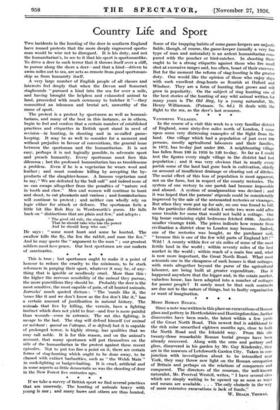* * * *
VANISHING VILLAGES.
In the course of a visit this week to a very familiar district of England, some sixty-five miles north of London, I came upon some very distressing examples of the flight from the land. One village which had a population of just over 800 persons, mostly agricultural labourers and their families, in 1872, has to-day just under 200. A neighbouring village has fallen from 180 in 1910 to 120 to-day. So far as I could test the figures every single village in the district had lost population ; and it was very obvious that in nearly every parish some of the land had gone back in cultivation, chiefly on account of insufficient drainage or clearing out of ditches. The social effect of this loss of population is most apparent, not on the farm, but in respect of the county rectories. The system of one rectory to one parish had become impossible and absurd. A system of amalgamation was devised ; and it was hoped that the parsons' stipends could be considerably improved by the sale of the untenanted rectories or vicarages. But when they were put up for sale, no one was found to bid. In the particular district of which I write two were sold after some trouble for sums that would not build a cottage. One big house containing eight bedrooms fetched £600. Another smaller vicarage £450. The prices indicate how remote from civilization a district close to London may become. Indeed, one of the rectories was bought, as the purchaser said, " because this is one of the few wild parts of England left !" Wild ! A county within five or six miles of some of the most fertile land in the world ; within seventy miles of the best market in the world ; within reach of a main line and, what is now more important, the Great North Road. What most astounds one in the cheapness of such houses is that cottages, with rents altogether beyond the purse of the agricultural labourer, are being built at greater expenditure. Has it happened anywhere that the bigger and, in the estate market, valueless house, has been adapted into a number of cottages for poorer people ? It surely must be that such contrasts are due not to the nature of things, but to faulty organization or want of imagination.
* *


















































 Previous page
Previous page